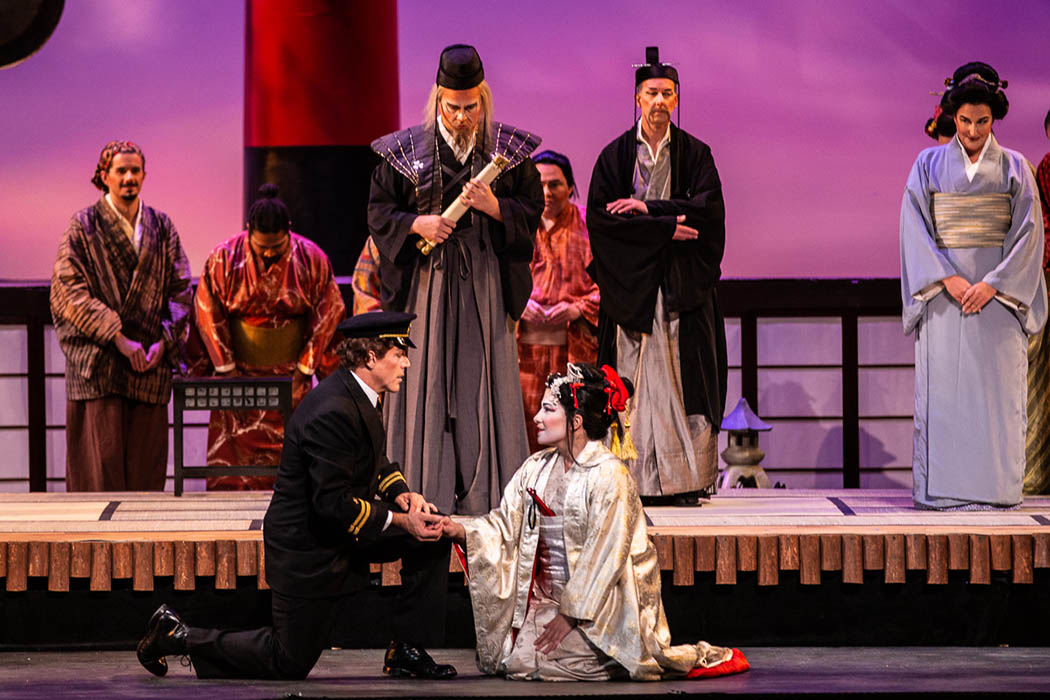Based on the published history, Knoxville Opera has offered a production of Giacomo Puccini’s 1904 Madama Butterfly every eight years or so—on average—since the company was founded in 1978. Its sixth one was performed this past weekend at the Tennessee Theatre, an event which places Madama Butterfly among the three most-produced operas for the company, the others being La Bohème and Lucia di Lammermoor. Despite this fact—and the opera’s substantial popularity due to its relatable story and luscious score—Madama Butterfly presents opera companies with a number of complications that affect a production’s success—not just in the obvious casting of singers, but also in the overall chemistry of storytelling that is often bound by an audience’s historic expectations. In this case, Knoxville Opera’s Madama Butterfly, directed by Brian Deedrick with musical direction by Brian Salesky, was a wealth of individual vocal and dramatic talents, but its ensemble chemistry failed to match the sum of those impressive parts.
The story of an American naval officer visiting Nagasaki who recklessly weds a young geisha, only to abandon her, Madama Butterfly is both melodrama and a musical masterpiece. Of course, the role of that geisha, Cio-Cio San, ranks at the top of an opera company’s issues. That impressive soprano of strength and versatility must intricately and dramatically paint an image of a young teenage girl, full of naive notions of love that are still youthful, but complex. Knoxville Opera’s selection was the vocally splendid Danielle Pastin, a soprano who sang Cio-Cio San with a silky-smooth, radiant voice of beautifully controlled character and power. Her Act II “Un bel di” was, as expected, charming and poignant. However, while I have no doubt that Pastin is also an actress of substantial dramatic ability, her Cio-Cio San was missing the big picture: the wistfulness, fragility, and teenage naïveté required to convey a 15-year old bride and the tragedy of being disowned—or even the more tragic poignance of an abandoned 18-year old lover and mother as Cio-Cio San is in Acts II and III.
Tenor Richard Troxell created an attractive Lt. B.F. Pinkerton, singing the role with a sensual edge and strength that delighted and commanded one’s attention. Similarly, though, Troxell’s vocal attractiveness was simply not enough to convert the moral bankruptcy of his passion for Cio-Cio San into a credible romantic affair, despite Puccini’s own luscious musical lovemaking.
A real highlight of the evening was baritone Sean Anderson as U.S. Consul Sharpless. Anderson is certainly a face and voice familiar to Knoxville Opera audiences, having appeared previously in comic roles in The Impressario, The Pirates of Penzance, L’elisir d’amore, and Die Fledermaus, among others. Vocally stylish and dramatically honed, Anderson gave his Sharpless a well-portrayed, beautifully sung character, full of nuance and substance that illustrated the moral ambiguity of his approval/disapproval of Pinkerton’s actions.
Also notably impressive as Suzuki, Cio-Cio San’s faithful servant, was mezzo-soprano Lisa Chavez. In many ways, her stage business becomes dramatic glue as she enters, exits, carries, arranges, and rearranges the necessary household belongings. Not only did she make this movement feel natural and simple, she sang the role with an oh-so appealing clarity and quiet strength.
In the category of “There Are No Small Roles”, bass David Crawford was a magnificent Bonzo, Cio-Cio San’s uncle who, finding that she has abandoned their native religion, shows up at the “wedding” to disown her. Tenor Nicholas Nestorak was an appropriately slippery and obsequious Goro, the matchmaker/marriage broker.
Always a satisfying theatrical highlight of Madama Butterfly, the wordless “Humming Chorus” had the Knoxville Opera Chorus offstage and lovingly synced with Maestro Salesky’s Knoxville Symphony Orchestra in the pit—supplemented by John Horner’s kinetic and soulful lighting marking the transition between Acts II and III.
The Knoxville Opera 2019-20 season continues in February with Charles Gounod’s Romeo & Juliet and in May with Harriet Tubman: When I Crossed That Line To Freedom by Nkeiru Okoye.
Photo above courtesy of InsideOfKnoxville.com







